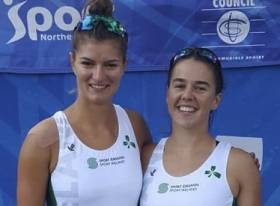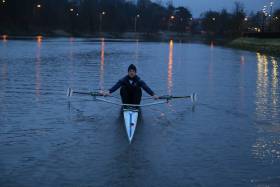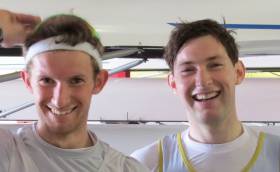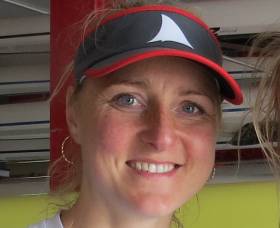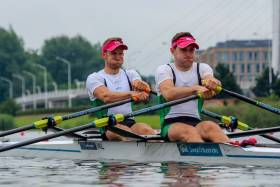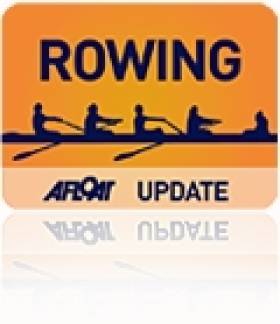Displaying items by tag: World Cup Regatta
Ireland's Dukarska and Crowley Sixth at Rotterdam World Cup
#Rowing: Ireland's Aileen Crowley and Monika Dukarska took sixth in the A Final of the women's pairs at the World Cup Regatta in Rotterdam. Ireland featured well in the early stages, but Australia and New Zealand moved away. They would finish in that order after a good battle. Britain took the bronze. Ireland and Spain battled for fifth, with Spain taking it by 1.63 seconds.
Lydia Heaphy and Denise Walsh finished sixth in their B Final of the lightweight double sculls, to take 12th overall.
World Cup Regatta, Rotterdam, Day Three (Irish interest)
Women
Pair - A Final: 1 Australia 7:26.15, 2 New Zealand 7:27.57, 3 Britain 7:40.51; Ireland (A Crowley, M Dukarska) 7:50.08.
Lightweight Double Sculls - B Final (places 7 to 12): 6 Ireland (L Heaphy, D Walsh) 7:45.98.
Irish Crews Progress to A Finals at World Cup Regatta
#Rowing: Ireland took three A Final places from their first three races at the World Cup Regatta in Rotterdam this morning.
Philip Doyle and Ronan Byrne, the Ireland men's double, won their race. They took the lead and held it right through. Germany were their closest challengers, while Australia One finished well to to take the third qualification place.
The Ireland women's pair of Monika Dukarska and Aileen Crowley and lightweight single sculler Gary O'Donovan also qualified for A Finals.
The pair took the race to the other crews and led at 1500 metres. Spain and Romania covered the final 500 metres with real pace, but while Romania passed Ireland to win, Dukarska and Crowley came home ahead of Spain, who took the third qualification spot.
Gary O'Donovan finished fast in the semi-final to take second. He had been third for much of the contest. However, Jake McCarthy fell just short, taking fourth. He is set for a B Final.
Puspure Wins Battle of the Ireland Crews at Poznan
#Rowing: Sanita Puspure won the B Final of the women’s single sculls at the World Cup Regatta in Poznan today. The focus may have been on the battle between Puspure and Monika Dukarska, but Puspure’s main challenger down the course was Megan O’Leary of the United States. She finished a close-up second, with Dukarska third, 3.55 seconds behind her Ireland team-mate.
In the B Final of the women’s pair, the new crew of Aifric Keogh and Aileen Crowley started well but had to give way to the more accomplished United States crew of Kathrin Roach and Sophia Vitas, who took eighth overall.
World Cup Regatta, Poznan, Poland, Day Three (Selected results; Irish interest)
Women
Pair – B Final: 1 United States 7:22.54, 2 Ireland (A Keogh, A Crowley) 7:30.09.
Single Sculls – B Final: 1 Ireland One (S Puspure) 7:28.79, 2 United States Two (M O’Leary) 7:29.35, 3 Ireland Two (M Dukarska) 7:32.34; 4 Germany Two 7:36.36, 5 United States One 7:37.43, 6 Austria Two 7:40.21.
#Rowing: The Ireland lightweight double scull of Paul and Gary O’Donovan won their semi-final at the World Cup Regatta in Belgrade today. In a race run in rainy conditions, the crews were closely-packed in the early part of the race, with Ireland taking a marginal lead by halfway. But then the O’Donovans moved and the race from there was about who would take second and third and join Ireland in the A Final. The Netherlands and Spain did the business to stay in the hunt for medals.
Britain’s Will Fletcher and Peter Chambers won the other semi-final in a fast time.
World Cup Regatta, Belgrade, Day Two (Irish interest, selected results)
Men
Lightweight Pair, Exhibition Race (Contest for Lanes): 1 Britain (J Cassells, S Scrimgeour) 6:39.30, 2 Ireland (M O’Donovan, S O’Driscoll) 6:41.61, 3 Russia 6:43.42, 4 Hungary 7:06.15.
Lightweight Double Sculls – Semi-Finals (Three to A Final; rest to B Final). Semi-Final One: 1 Britain (P Chambers, W Fletcher) 6:23.98, 2 Poland 6:25.85, 3 Czech Republic 6:26.34.
Semi-Final Two (Three to A Final; rest to B Final): 1 Ireland (G O’Donovan, P O’Donovan) 6:30.70, 2 Netherlands 6:32.26, 3 Spain 6:33.89.
Women
Single Sculls – Repechage (First Two to A Final; rest to B Final): 1 Britain (V Thornley) 7:39.32, 2 Ireland (S Puspure) 7:42.17; 3 Belarus Three 7:46.28, 4 Belarus Two 7:28.26, 5 Czech Republic 7:52.49.
Puspure Qualifies for A Final at World Cup Regatta
#Rowing: Sanita Puspure took second in the repechage and qualified for the A Final of the women’s single sculls at the World Cup Regatta in Belgrade today. The early leader was Victoria Thornley of Britain, and she did not relinquish the advantage. A battle developed behind her between Puspure and Tatsiana Kukhta of Belarus, which Puspure won. She moved in the third quarter and held a clear second place at the end.
World Cup Regatta, Belgrade, Day Two (Irish interest, selected results)
Men
Lightweight Pair, Exhibition Race (Contest for Lanes): 1 Britain (J Cassells, S Scrimgeour) 6:39.30, 2 Ireland (M O’Donovan, S O’Driscoll) 6:41.61, 3 Russia 6:43.42, 4 Hungary 7:06.15.
Women
Single Sculls – Repechage (First Two to A Final; rest to B Final): 1 Britain (V Thornley) 7:39.32, 2 Ireland (S Puspure) 7:42.17; 3 Belarus Three 7:46.28, 4 Belarus Two 7:28.26, 5 Czech Republic 7:52.49.
#Rowing: Paul and Gary O’Donovan won their heat and qualified directly for the A/B Semi-Finals at the World Cup Regatta in Belgrade this morning. As they often do, the UCD/Skibbereen duo won it in a sprint finish, overtaking the Czech Republic coming up to the line to win by six hundredths of a second. The Czechs and the Netherlands One had disputed the lead through the race, but the O’Donovans tracked them and drew on their remarkable finishing speed to win in six minutes 29.03 seconds.
Peter Chambers and Will Fletcher of Britain won the second heat in a time of six minutes 35.22 seconds.
World Cup Regatta, Belgrade Serbia, Day One (Selected Results; Irish interest)
Men
Pair – Heat Two (First Three to A/B Semi-Finals; rest to Repechage): 1 Britain 6:42.81, Netherlands 6:46.34, 3 Spain 6:50.69; 4 Ireland (M O’Donovan, S O’Driscoll) 6:53.50.
Lightweight Double Sculls – Heat Three (First Two to A/B Semi-Finals; rest to Repechage): 1 Ireland (G O’Donovan, P O’Donovan) 6:29.03, 2 Czech Republic 6:29.09; 3 Netherlands One 6:38.69
Heat Two: 1 Britain (P Chambers, W Fletcher) 6:35.22.
Women
Single Sculls – Heat Two (Winner to A Final; rest to Repechage): 1 Austria (M Lobnig) 7:49.47; 2 Belarus (E Karsten) 7:51.74, 3 Ireland (S Puspure) 7:53.20.
Lightweight Single Sculls – Heat Two (First Two to A Final; rest to Repechage): 1 Ireland (D Walsh) 8:07.51, 2 Poland (J Dorociak) 8:08.22; 3 Switzerland Two 8:11.65.
Ireland Pair Qualify for Semi-Finals at World Cup Rowing
#ROWING: Lisa Dilleen and Leonora Kennedy qualified directly for the A/B semi-finals at the World Cup Rowing regatta in Aiguebelette in France this morning. The Ireland crew, which had finished fourth at the European Championships, knew a place in the top three of their heat would be enough to see them through without the need for a repechage. They were in the top three, with Canada and United States Two through the key parts of the race, but it was Canada which finished best to win narrowly from United States Two.
World Cup Regatta, Aiguebelette, France, Day One (Selected Results, Irish interest)
Men
Lightweight Single Sculls – Heats (Time Trials; First Two Directly Through to A/B Semi-Finals; rest to Repechage) – Heat One: 1 China (Tiexin Wang) 7:02.36, 2 France (D Piqueras) 7:07.64; 5 Ireland Two (M O’Donovan) 7:20.78
Heat Three: 1 Ireland One (P O’Donovan) 7:11.34, 2 Britain (Z Lee-Green) 7:15.60.
Women
Pair – Heat Two (First Three to A/B Semi-Finals; rest to Repechage): 1 Canada (N Mastracci, S Grainger) 7:13.29, 2 United States Two (G Luczak, C Lind) 7:13.87, 3 Ireland (L Kennedy, L Dilleen) 7:18.15; 4 Germany Two 7:32.77, 5 China Two 7:37.06.
Pararowing – Arms and Shoulders Men’s Single Sculls – Heat Two (First to A Final; rest to Repechage): 5 Ireland (T Kelly)


























